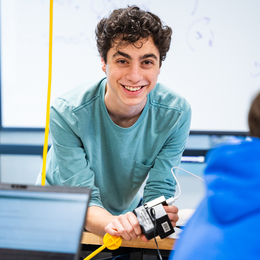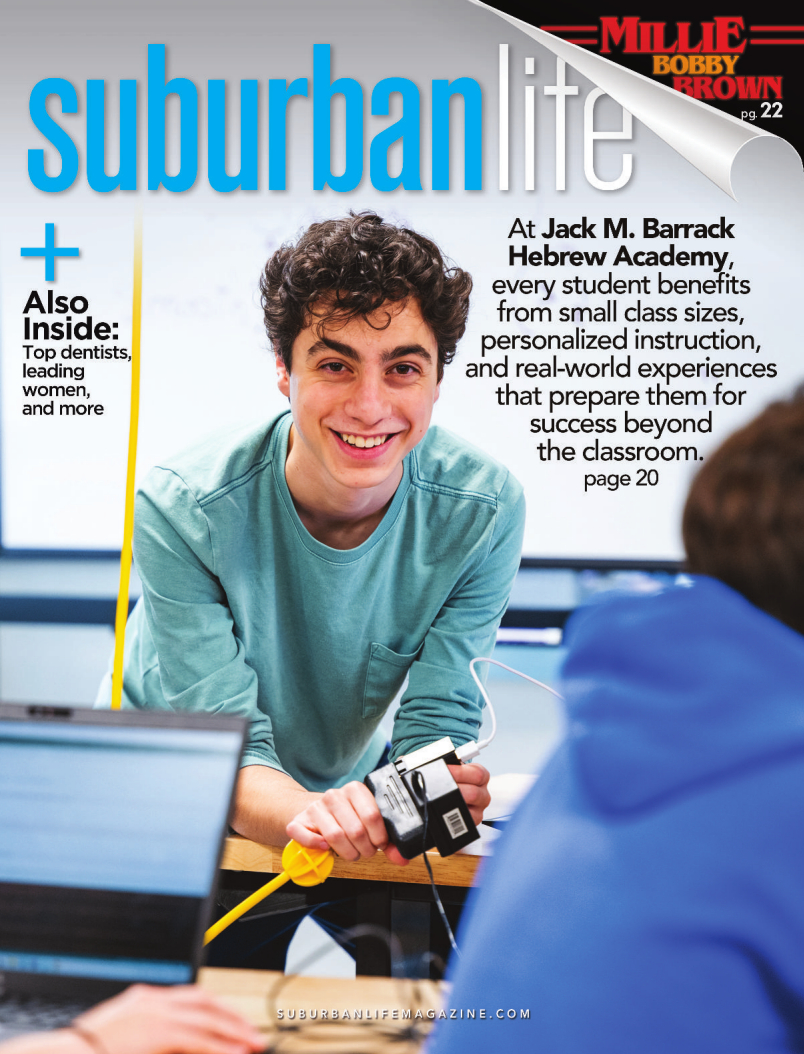
An Extraordinary Education
At Jack M. Barrack Hebrew Academy, every student benefits from small class sizes, personalized instruction, and real-world experiences that prepare them for success beyond the classroom.
When the Lechtman family began pondering educational options for their son, Simon, one school in particular stood out more than all the others: Jack M. Barrack Hebrew Academy in Bryn Mawr.
“The smaller class sizes and more individualized attention really drew us,” says Aryn Lechtman, whose son, Simon, is a 10th grade student at the school. “We feared him getting lost in the bigger classes in public school. He needed to be taught about thinking critically instead of just regurgitating information. Barrack told us they would meet him where he needed them to, and that has definitely been our experience.”
Individualized attention is a hallmark of a Barrack education. Small class sizes and strong relationships with faculty enable students to excel, according to Head of School Rabbi Marshall Lesack ’97.
“We are focused on the whole child and the growth of each student,” Rabbi Lesack says. “Our faculty and staff work hard to understand what each student needs in order to have a positive learning experience. We want them to reach their academic goals within a supportive community, to find their right-fit university and, ultimately, to help them become the best versions of themselves.
“This means not only teaching them and guiding them along their academic journey, but also serving as role models as they identify their interests and passions during the middle and high school years,” he continues. “At Barrack, they learn to meaningfully engage with their teachers, share their ideas, and internalize that our community values them for their insights and their questions.”
By building such close relationships with educators early in life, students are likely to be more comfortable advocating for themselves in college and beyond. Kristi Yablon, a Barrack math teacher, says the dynamic also enables students to better grasp and retain complex concepts.
“I can schedule times to meet with students who require extra help outside of class, but I also am able to plan lessons that allow me time to check in with students individually during class without disrupting other students,” she adds. “In larger classes, students can more easily avoid participating or paying attention. Smaller classes challenge everyone to be more involved and to [learn how to] advocate for themselves.”
A Strong Foundation
Barrack has cultivated a welcoming environment in which students are challenged to think critically and actively engage with their peers and teachers. Students are encouraged to treat one another with kindness and view themselves as part of a true community. In addition to nurturing students’ academic performance and social and emotional development, the school prioritizes students’ understanding of their Jewish heritage.
Barrack has cultivated a welcoming environment in which students are challenged to think critically and actively engage with their peers and teachers. Students are encouraged to treat one another with kindness and view themselves as part of a true community. In addition to nurturing students’ academic performance and social and emotional development, the school prioritizes students’ understanding of their Jewish heritage.
“Our values are rooted in our traditions, which are thousands of years old,” Rabbi Lesack says. “We know education is a journey, a path. Who they are when they enter Barrack will evolve over time. But our ethics and values are timeless and can be found on every classroom wall, in our lobby, and as part of our activities. This school year, our theme is Derech Eretz, or Everyday Ethics. We want to graduate young Jewish adults who engage the world with a strong moral compass.”
Yablon is not only an instructor, but also a new Barrack parent. Her son recently enrolled at the school. Even in a short amount of time, she has watched her son become a more responsible and conscientious student.
“The code of conduct is based on Jewish values,” she says. “As a result, students understand what is expected of them. The environment is one that celebrates individuality and hard work. It’s a school where teachers and parents find alignment to ensure that the students build a strong foundation of knowledge and skills to help them reach their full potential.”
Barrack’s role as a pluralistic Jewish school is very important to Lechtman’s family. She feels as though her family and the school share common core values.
“Students learn the ancient text, but it’s part of understanding how to think critically, how it relates to their lives now,” she says. “It’s worked into all of their lessons, in their annual theme, how they’re treating each other.”
Diving Deep
Lechtman says Simon has excelled in the Barrack Institutes, particularly in one focused on science, technology, engineering, the arts, and math, collectively known as STEAM. The school’s three Institutes—STEAM, Business and Entrepreneurship, and Art—provide upper school students with opportunities to pursue areas of personal interest with an intensive focus on learning, skill development, and real-world readiness.
Lechtman says Simon has excelled in the Barrack Institutes, particularly in one focused on science, technology, engineering, the arts, and math, collectively known as STEAM. The school’s three Institutes—STEAM, Business and Entrepreneurship, and Art—provide upper school students with opportunities to pursue areas of personal interest with an intensive focus on learning, skill development, and real-world readiness.
“It was like learning a new language, something foreign to him, but he loves it,” Lechtman says of her son’s STEAM experience so far. “This is something he’s really interested in, and they are diving deep into it. … He’s blossoming, and this is a very nice way to round out his education.”
Beginning in ninth grade, students choose the Institute that is of most interest to them and focus on themed learning and electives for at least two years, after which they have the option to continue Institute classes or fulfill graduation requirements through other elective course offerings. No matter which option a student chooses, Rabbi Lesack says the student can expect “innovative, hands-on, real-world learning experiences” designed to build foundational knowledge in an area that could very well influence their future.
For example, students in the Business and Entrepreneurship Institute visited Rivermark Northern Liberties Apartments in Philadelphia’s Northern Liberties neighborhood last spring to see business ideas being put into action. “They were asked to think about everything necessary to make this sort of business successful, from the first, initial concept to all the different parts of the process,” Rabbi Lesack adds.
Barrack offers an array of co-curricular opportunities that encourage students to explore their interests and express their creativity. Whether playing an instrument, performing on stage, or working in visual media, students have countless ways to pursue their passions. Electives and clubs in music, theater, and fine arts include everything from musicals and coffee houses, to 2D and 3D design, to painting, sculpture, and ceramics.
Barrack’s robust athletics program features nearly 40 teams and offers students year-round competition. With 75 percent student participation, the Cougars have secured multiple championships through the years. Now as a member of the Friends Schools League, and a continuing member of the Pennsylvania Independent Schools Athletic Association, students compete against nearby private schools as well as other Jewish day schools across the Mid-Atlantic and Northeast.
Beyond arts and athletic opportunities, more than 50 student-led clubs and six student publications invite students to engage with the world beyond the classroom. There’s a club for nearly every interest: creative writing, Ultimate Frisbee, engineering, sports debate, the stock market, and more. Barrack also supports a range of academic competitions and outcome-driven clubs that promote critical thinking, collaboration, and real-world problem-solving. Programs like Mock Trial, Model UN, and STEAM competitions offer venues for students to challenge themselves and gain skills that prepare them for college and beyond.
“The school is so nurturing,” Lechtman says. “It is academically rigorous but also very warm. … They wanted to get to know [Simon] in ways we have never seen before. They really want the students to be successful.”
In all, she believes Jack M. Barrack Hebrew Academy has exceeded her family’s expectations. She has one word to describe her son’s experience at Barrack: extraordinary.
Jack M. Barrack Hebrew Academy
272 S. Bryn Mawr Avenue
Bryn Mawr
(610) 922-2350
www.jbha.org
272 S. Bryn Mawr Avenue
Bryn Mawr
(610) 922-2350
www.jbha.org
Photo courtesy of Jack M. Barrack Hebrew Academy
Published (and copyrighted) in Suburban Life, September 2025.



